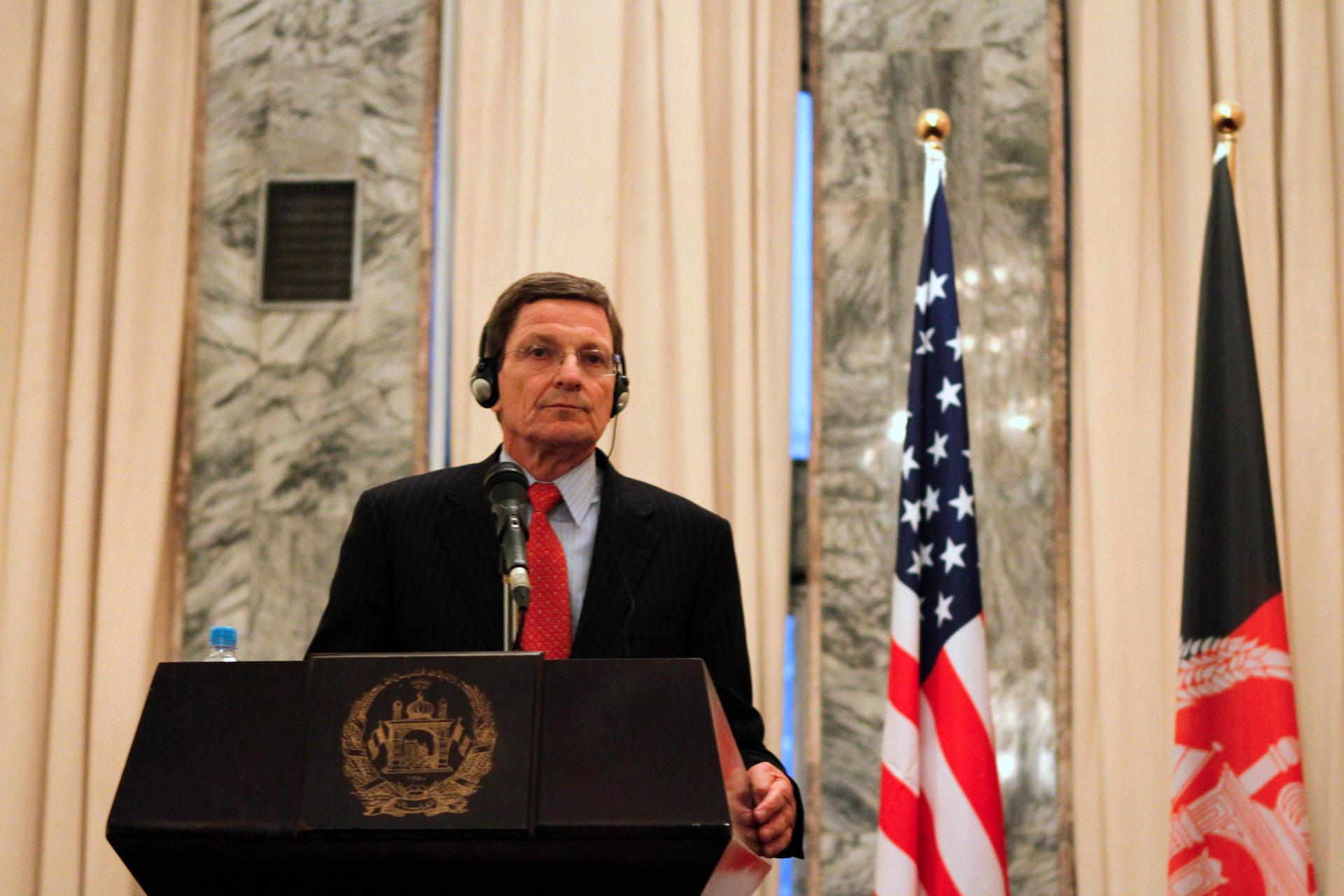Afghans, Taliban, U.S. in three-way talks that offer ‘best chance’ for peace
U.S. special envoy for Afghanistan and Pakistan Marc Grossman speaks during a news conference in Kabul on Jan. 22, 2012. The United States has not decided whether to satisfy a request from the Taliban to release five prisoners being held at Guantanamo Bay
U.S. officials and officials from the Afghan government of President Hamid Karzai have joined three-way negotiations with the Taliban in an effort to end the decades-old war in Afghanistan, the Wall Street Journal reported.
President Hamid Karzai, who had been left out of recent talks between the U.S. and the Taliban, told the Journal he thinks the Taliban is interested in a peace settlement.
Afghanistan expert Michael Semple agrees — and says it’s in the United States’ best interest to engage them.
“If you want to bring an end to a conflict, you have to talk to your enemy. There’s no point in talking to your allies,” Semple said.
Semple, a fellow at The Carr Center at Harvard’s Kennedy School, said the Taliban admitted to him they made “serious mistakes” when they were in power in Afghanistan. Among the mistakes they cited include giving refuge to Al-Qaeda and implementing social policies — especially targeting women — that alienated many Afghans.
“It’s not just that I’ve heard it from senior Taliban,” Semple said. “It’s clear that now it’s starting to drive the politics of the movement. It’s gone from being a lunatic fringe part of the Taliban saying this to the mainstream of the Taliban have realized ‘We have to endorse this position.’ “
Semple was a United Nations employee in Aghanistan in the early 1990s when the Taliban came to power, and he worked closely with Taliban leaders before the attacks of Sept. 11.
He said the same leaders still head the Taliban and over the past several years, they have come to understand their policy mistakes and they’ve also analyzed those mistakes to make sure they don’t repeat them if they join the Afghani government.
Semple argues that now is perhaps the last, best chance for a peace deal to be struck. The radicalized, younger Taliban have grown up knowing nothing but war with the United States and its Afghan allies. They have very little interest in peace, Semple said, so is peace can’t be reached now, “the war is going to continue for many more years to come,” Semple said.
A real peace process is now underway in the country, Semple said, but before there can be any serious progress in the talks, there are still a number of unresolved issues with how the two sides can talk to each other.
The Taliban have asked for some men to be released from U.S. custody in Guantanamo Bay, Cuba. They wouldn’t necessarily be released, but rather be transferred to a much more comfortable imprisonment somewhere in the Middle East — or so the plan goes.
Critics say that as many as 27 percent of those who’ve already been released from Guantanamo, and at least 10 on the low end, have returned to terrorist activity after their release.
“It can become very dangerous for the United States if continuation of war becomes the default position,” Semple said. “If you take a position that encouraging peace is actually in the national interest of the United States, then you have to ask what you have to do to achieve that. And this type of move comes in that category.”
There’s also an incentive for the Karzai Afghan government to reach some sort of accord to end the war. With NATO promising to wind down operations in Afghanistan by 2014, Karzai’s government is beginning to realize it’s going to have to do politics, Semple said.
“This kind of big land war that’s been going on over the past few years isn’t going to continue. This is focusing minds in Afghanistan,” Semple said. ” I think we’re going to be seeing in the months ahead all sorts of Afghans who we have been told over the past 10 years” can’t work with each other begin to sit down.
